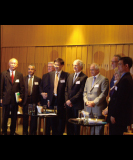You are browsing > Service in Taiwan > Development
WTO/OECD report highlights unique contribution of TBT/SPS Agreements to regulatory cooperationWTO
WTO/OECD report highlights unique contribution of TBT/SPS Agreements to regulatory cooperation
The WTO Agreements on Technical Barriers to Trade (TBT) and on the Application of Sanitary and Phytosanitary Measures (SPS), and their related Committees, provide a unique framework for international regulatory co-operation contributing to ease trade frictions, according to a joint publication issued by the WTO and the Organisation for Economic Co-operation and Development (OECD) on 3 July at the Aid for Trade Global Review 2019.
The publication "Facilitating Trade through Regulatory Co-operation: The Case of the WTO's TBT/SPS Agreements and Committees" highlights how specific disciplines of the Agreements and practices of the related Committees promote international regulatory co-operation. These include the notification of draft measures, harmonization with international standards, and discussion of specific trade concerns.
The study, launched by WTO Director-General Roberto Azevêdo and OECD Secretary General Ángel Gurría, also makes recommendations on how to better leverage the transparency and cooperation opportunities provided by the TBT and SPS Agreements, which facilitate the setting of notification requirements for proposed regulatory measures with potentially significant trade effects.
The TBT and SPS Agreements strongly encourage WTO members to use relevant international standards as the basis for their measures, including disciplines on equivalence and recognition of foreign conformity assessment which help to ensure that traders do not face duplicative requirements or procedures when regulations differ across markets. These disciplines encourage the reduction of regulatory diversity and associated trade costs, according to the publication.
"In a nutshell, this is about members working together to bridge differences in their regulatory systems, including through increased dialogue, transparency and cooperation. This may happen, for example, by agreeing to align with international standards, or by mutual recognition. This involves many areas, for example, clinical trials for medical devices, veterinary certificates, safety of electronics, common food standards, or protecting consumers from harmful ingredients in cosmetics. The list goes on. This closer coordination helps to disseminate good practices and counter, to some extent, the costly effects of regulatory systems acting in isolation. In turn, it leads to lower trade costs and increased opportunities for traders everywhere," said DG Azevêdo. Read his full speech here.
Ángel Gurría said this joint study comes on the back of an important volume of work between the two organizations and is especially pertinent in the current context of escalating trade tensions, which weaken investment prospects and growth potential putting a strain on the international trading system. "Today, more than ever, it is crucial that we continue to work together to pursue our goals in unison. We remain committed at the OECD to working with the WTO in many ways in the design, development and delivery of better trade policies for better lives," he added.
The publication was jointly prepared by the OECD and the WTO secretariats in the framework of OECD work on international regulatory cooperation. It is part of a series started in 2014 that provides overviews of the structure, governance, instruments and processes of international organizations in support of international regulatory cooperation.
The joint publication can be downloaded here.









